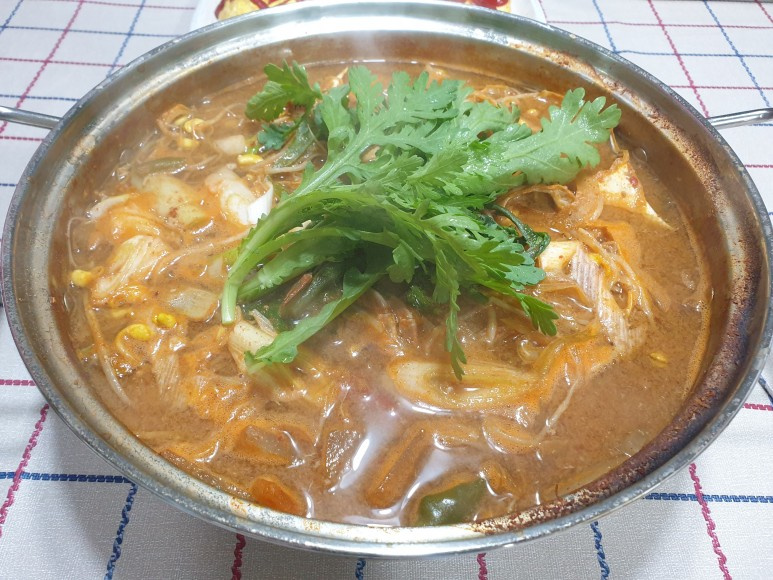Spicy and Refreshing Crab Stew (Kkotgetang)
The Ultimate Crab Stew with an Unforgettable Broth!

We made this hearty crab stew using fresh crabs bought locally. The broth is incredibly savory and satisfying!
Main Ingredients- 6 Fresh Crabs
- A small piece of Radish (about 150g)
- 1/2 Onion
- 2 handfuls of Bean Sprouts (about 100g)
- 2 Cheongyang Peppers (Korean chili peppers)
- 1/2 Red Chili Pepper
- 1 Green Onion (Scallion)
- A handful of Crown Daisy (Shunggote)
Seasoning and Broth Ingredients- 3 Tbsp Gochugaru (Korean chili flakes)
- 1 Tbsp Doenjang (Fermented soybean paste)
- 2 Tbsp Fish Sauce or Soy Sauce for soup
- 1 Anchovy-Kelp Tea bag (or 1 liter of anchovy broth)
- 2 tsp Salt (adjust to taste)
- 1 tsp Dashida (MSG-based seasoning, optional)
- 1 tsp Minced Garlic
- A pinch of Ground Ginger (or 1/2 tsp fresh grated ginger)
- 3 Tbsp Gochugaru (Korean chili flakes)
- 1 Tbsp Doenjang (Fermented soybean paste)
- 2 Tbsp Fish Sauce or Soy Sauce for soup
- 1 Anchovy-Kelp Tea bag (or 1 liter of anchovy broth)
- 2 tsp Salt (adjust to taste)
- 1 tsp Dashida (MSG-based seasoning, optional)
- 1 tsp Minced Garlic
- A pinch of Ground Ginger (or 1/2 tsp fresh grated ginger)
Cooking Instructions
Step 1
First, let’s prepare the crabs. It’s best to use fresh, lively crabs for the most flavorful broth. If you can’t get live ones, crabs that arrived yesterday are fine too. Clean them thoroughly.

Step 2
Prepare the vegetables that will go into the stew. Slice the onion thinly. Cut the Cheongyang peppers and red chili pepper diagonally. Slice the green onion diagonally as well. Wash the crown daisy (shunggote) and set aside for garnish at the end.

Step 3
Wash the bean sprouts and drain them. These will add a fresh taste and a pleasant crunch to the stew.

Step 4
Thinly slice the radish into bite-sized pieces, like thin rectangles. This ensures they cook through nicely and become tender in the stew.

Step 5
Now, let’s start building the broth. Pour about 1 liter of water (or anchovy broth) into a pot. Dissolve 1 tablespoon of doenjang (fermented soybean paste) in the water. Add the sliced radish and the anchovy-kelp tea bag. Stir in 3 tablespoons of gochugaru (Korean chili flakes) to give the broth its signature red color and spicy flavor. Bring this to a boil.

Step 6
Add 2 tablespoons of fish sauce (or soy sauce for soup) for an extra layer of umami. Let it simmer and develop its flavors.

Step 7
Time to prepare the crabs! Remove the top shell (carapace). Scoop out the innards and the triangular-shaped “sand bag” near the mouth. Use kitchen scissors to trim off the mouthparts and gills. Cut the crab bodies in half.

Step 8
Once cleaned, rinse the crab pieces briefly under cold water and drain. This cleaning process ensures a cleaner broth.

Step 9
Season the stew to your liking. Add salt and Dashida (optional) gradually, tasting as you go. Getting the saltiness just right is key to a delicious crab stew.

Step 10
Gently place the prepared crab pieces into the simmering broth. The aroma will start to fill your kitchen as the fresh crab cooks.

Step 11
Add the sliced onion and chili peppers. Their sweetness and aroma will further enrich the crab stew.

Step 12
Now, add the bean sprouts for a refreshing crunch. Be careful not to overcook them, as they can become mushy if boiled for too long.

Step 13
Stir in 1 teaspoon of minced garlic. Garlic adds a pungent depth and helps eliminate any potential fishiness from the crab.

Step 14
If you have fresh ginger, add about 1/2 teaspoon of grated ginger. Ginger has a wonderful way of balancing flavors and enhancing the seafood taste. If using ground ginger, use a very small pinch.

Step 15
Cover the pot and let it simmer for about 5-7 minutes over medium heat, or until the bean sprouts are tender and the crab is fully cooked. Avoid overcooking the crab, as the meat can become dry.

Step 16
Finally, garnish generously with the sliced green onion and crown daisy. Let it simmer for another moment. Your delicious, savory, and refreshing Kkotgetang is now ready to be enjoyed! Serve hot.



